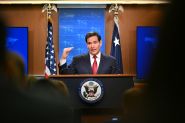
With Sayyed Hassan Nasrallah’s funeral set to conclude this Sunday, Hezbollah will soon face pressing challenges it has sought to evade — both within its own ranks and across Lebanese society.
The Hezb urgently needs a massive influx of Iranian funds to fulfill its long-standing reconstruction promises. However, recent developments indicate a stark reality: Iranian flights carrying cash are no longer permitted to land in Lebanon, and Hezbollah’s efforts to overturn this restriction have so far failed.
In the aftermath of the funeral, Hezbollah may intensify its attempts, potentially deepening internal divisions. While some factions advocate for diplomatic engagement with the government, others push for escalations in the streets, even at the risk of clashes with security forces. For them, Hezbollah’s very survival is at stake, making any compromise unacceptable.
Beyond this, Hezbollah faces another critical challenge: Lebanon’s government, alongside the international community and Arab states, insists on full transparency regarding the source and allocation of reconstruction funds. Any financial aid must comply with international standards and be distributed through official Lebanese institutions under state supervision.
This requirement comes with stringent conditions. The World Bank has outlined several key reforms, including structural changes in the banking sector, public administration and the establishment of a dedicated fund to manage reconstruction resources. Lebanese authorities are thus calling for an international donor conference to assess global willingness to support the country’s recovery.
The initial phase — clearing war debris — alone demands an estimated $1 billion. The World Bank has pledged $250 million in loans, potentially unlocking additional contributions from donors to cover the full cost.
Preliminary estimates put Lebanon’s direct and indirect war-related losses at $14 billion, while full reconstruction is projected to require around $12 billion. The Lebanese government now faces a dual challenge: securing urgent funding while ensuring strict oversight and transparency in how these resources are managed and allocated.
According to informed sources, reconstruction will not be possible without political and security stability, which necessitates full implementation of UN Resolution 1701 and related agreements. This includes preventing Hezbollah mainly from undermining internal security.
In this context, there is little room for tolerance regarding Hezbollah’s arsenal or its potential use within Lebanon, given the devastating consequences such a scenario could have on both war victims and the country as a whole.
From a political standpoint, these same sources assert that Lebanon’s reconstruction is now inextricably linked to the gradual dismantling of Hezbollah’s military infrastructure and the severing of its political, military and security ties with Iran.




Comments